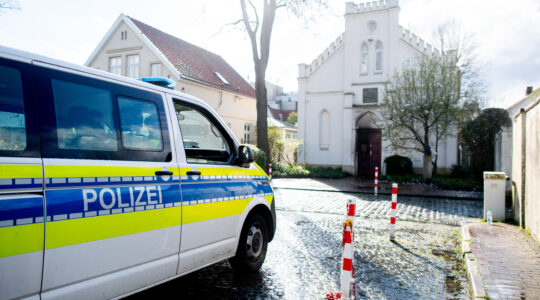OSNABRUCK, Germany (JTA) — When they sat down to eat, the 25 people gathered for Shabbat dinner at the temporary synagogue here on a recent Friday night segregated themselves along the spectrum of Jewish identity and experience.
At one end of a long table sat the old-timers, several of whom had been friends since childhood and could trace their family history in the area back more than a century.
Next came the Russian immigrants, mostly middle-aged couples who had arrived in Osnabruck, a city of 160,000 in the west German state of Lower Saxony, as part of the Russian Jewish influx that began with the fall of communism. At the table’s far end sat the teenagers, children of the immigrants who were born in Osnabruck or had arrived here as small children.
A bottle of vodka appeared on the table and Michael Grunberg, the community’s president, broke into a wide grin.
“We have had to learn some new traditions,” he said.
Grunberg has reason to be happy.
In the past two decades, Russian immigrants have increased the Jewish population of Osnabruck more than tenfold, breathing new life into what had been an aging, dwindling community and generating hope — for the first time since World War II — for a Jewish future here.
The influx permitted the community to hire its first rabbi in the mid-1990s. In January, it expects to open its newly renovated synagogue, enlarged to help accommodate the larger Jewish population. Some 30 children now study in the community’s Hebrew school on Sundays.
“We are very happy that they came,” Lea Mor, Grunberg’s sister-in-law and his deputy on Osnabruck’s Jewish council, said of the Russian immigrants. “Without them we would not have a community.”
It is a pattern that is evident across Germany, where some 90,000 Russian Jews have joined the German Jewish community over the past 20 years — making the country, by many accounts, the fastest-growing Jewish community in the Diaspora. The immigration was spurred by a German law, now since restricted, that allowed substantial Jewish immigration from former Soviet republics.
Though the number of newcomers has fallen off dramatically in recent years, Russian immigrants still comprise some 80 percent of the country’s Jewish population. In smaller communities such as Osnabruck, the figure exceeds 90 percent.
The Russian arrival has enabled an astonishing rejuvenation of Jewish life in Germany. Their numbers have breathed new life into defunct communities and led to the establishment of synagogues, schools and other community institutions.
But it also has brought particular challenges. Perhaps the biggest is how to integrate a culturally and linguistically distinct group that generally lacks Jewish knowledge and an understanding of democratic norms.
Grunberg, whose family has lived in Germany for two centuries, recalled how the Russians in Osnabruck could not understand why, in a country where Jewish communal officials often draw government salaries, he would choose to work for the community without pay. That led to suspicions of corruption.
Grunberg’s wife, Ruth de Vries, recalled difficulties in planning community events. Preparing the appropriate amount of food was nearly impossible, since the Russians would pile their plates to overflowing. There were other cultural differences, she said.
“We thought they were arrogant, and they thought we were simple. It was a problem,” said Inessa Goldman, a Jewish immigrant from Latvia who works on Jewish-Christian relations in Osnabruck.
“With time they accepted us,” she said of the German Jewish community.
Other immigrants expected the veteran German Jewish community to provide cradle-to-grave support of the kind they were accustomed to back home in the former Soviet Union.
“They didn’t understand that the synagogue can’t give them these things,” said Tanja Tschernjawski Gutman, a Ukrainian immigrant who has lived in Osnabruck for nearly 17 years. “The synagogue is just a religious community, not a social welfare agency.”
Those sorts of misunderstandings gave rise to all kinds of tension in the early years of the Russian immigration to Germany. Nearly 20 years since it began, political skirmishes continue to plague some communities, though the worst appears to be over.
Grunberg has held the community presidency in Osnabruck for 10 years. That’s the kind of control by veteran German Jews that majority Russian communities often resent, but in Osnabruck members of this mostly Russian immigrant community speak admiringly of Grunberg’s leadership.
“The epoch of big fights for power and influence ended,” said Tanya Smolianitski, an educator who teaches in several Jewish communities in the western part of Germany and lives about an hour from Osnabruck. “Those ‘troublemakers’ either already got the power they wanted or left the communities.”
Part of the improvement is because after 20 years, a homegrown generation that speaks fluent German yet understands the Russian mentality is emerging. In Osnabruck, the teenage youth leader speaks both languages. And according to Smolianitski, with more than half the Russian immigrant community over the age of 65, priorities are aligning with those of countless other Diaspora communities, shifting from integration to attracting young people to community life.
The generational shift is evident within families like the Tschernjawskis. Tanja’s husband’s parents came to Osnabruck seeking a better life and were never much interested in things Jewish, though they recently joined the community. Tanja herself was interested in Jewish life from the start but refuses to acknowledge the role her generation played in reviving Jewish life in Osnabruck, saying she was the one who was saved.
“I am not a hero,” she said.
Tanja’s daughter, Karina, sees it differently. Karina studies at a yeshiva for girls in Berlin financed in part by the Ronald S. Lauder Foundation, but she returns regularly to Osnabruck.
“My mom and a few of the other parents,” she said,” really saved the synagogue.”





